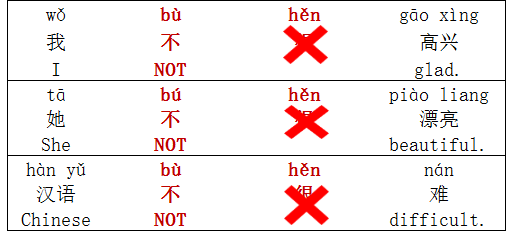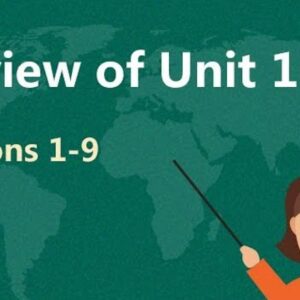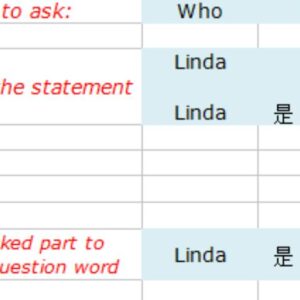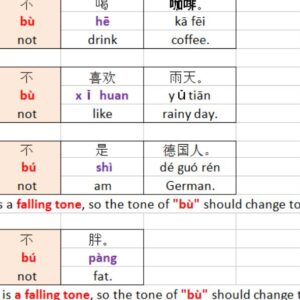In today’s lesson, we will certainly find out exactly how to define somebody or something by using an adjective in the sentence like someone or something is adjective, for instance, exactly how to state that I am hectic or Chinese is tough.
Dialogue
| 1) |
A: |
妈妈 |
, |
英语 |
难 |
吗 |
? |
|
|
mā ma |
, |
yīng yǔ |
nán |
ma |
? |
Mom, is English difficult? |
Listen |
|
|
B: |
英语 |
不 |
难 |
。 |
|
|
yīng yǔ |
bù |
nán |
. |
English is not difficult. |
Listen |
|
| 2) |
A: |
李丽 |
, |
你 |
好 |
吗 |
? |
|
|
lǐ lì |
, |
nǐ |
hǎo |
ma |
? |
Li Li, how are you? |
Listen |
|
|
B: |
我 |
很 |
好 |
, |
你 |
呢 |
? |
|
|
wǒ |
hěn |
hǎo |
, |
nǐ |
ne |
? |
I’m good and you? |
Listen |
|
|
A: |
我 |
也 |
很 |
好 |
。 |
你 |
忙 |
吗 |
? |
|
|
wǒ |
yě |
hěn |
hǎo |
, |
nǐ |
máng |
ma |
? |
I’m also good, are you busy? |
Listen |
|
|
I’m busy. |
Listen |
|
| 3) |
A: |
你 |
认 |
识 |
陈平 |
吗 |
? |
|
|
nǐ |
rèn |
shi |
chén píng |
ma |
? |
Do you know Chen Ping? |
Listen |
|
|
B: |
是 |
的 |
, |
我 |
认 |
识 |
。 |
|
|
shì |
de |
, |
wǒ |
rèn |
shi |
. |
Yes, I know her. |
Listen |
|
|
A: |
她 |
漂 |
亮 |
吗 |
? |
|
|
tā |
piào |
liang |
ma |
? |
Is she beautiful? |
Listen |
|
|
B: |
她 |
很 |
漂 |
亮 |
。 |
|
|
tā |
hěn |
piào |
liang |
. |
She is beautiful. |
Listen |
|
Vocabulary
| 忙 |
máng |
adj. busy |
|
| 难 |
nán |
adj. difficult |
|
| 漂亮 |
piào liang |
adj. beautiful |
|
Grammar
| Expressing “Subject + to be + adjective” |
| To describe someone or something by using an adjective in the sentence like “Subject + to be + adjective”, in Chinese we don’t translate “to be” here, instead, we’ll use the word 很 (hěn, very) before the adjective to link the sentence. |
 |
| Many learners are puzzled why we don’t translate “to be” as 是(shì) here, rather we put one more word 很 (hěn) between the subject as well as the adjective, which indicates very in English. Although 很 (hěn) means really, right here we do not suggest its literal definition of really in this context. So words 很 (hěn) is not utilized to emphazise “very”, just a connecting word to link the subject as well as the adjective. |
| Positive form: |
 |
|
|
| To share the negative type, we simply put “not”不 (bù) prior to the adjective. Please note that right here we don’t utilize 很 any more. |
| Negative form: |
 |
 |
| The transforming of the tone of 不 (bù) to (bú): When 不(bù) is adhered to by one more falling tone, which means 2 dropping tones stay together, the very first falling tone should change to a climbing tone. |








